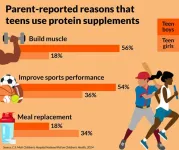(Press-News.org) Many women who receive chemotherapy experience a decreased ability to remember, concentrate, and/or think—commonly referred to as “chemo-brain” or “brain fog”—both short- and long-term. In a recent clinical trial of women initiating chemotherapy for breast cancer, those who simultaneously started an aerobic exercise program self-reported greater improvements in cognitive function and quality of life compared with those receiving standard care. The findings are published by Wiley online in CANCER, a peer-reviewed journal of the American Cancer Society.
The study, called the Aerobic exercise and CogniTIVe functioning in women with breAsT cancEr (ACTIVATE) trial, included 57 Canadian women in Ottawa and Vancouver who were diagnosed with stage I–III breast cancer and beginning chemotherapy. All women participated in 12–24 weeks of aerobic exercise: 28 started this exercise when initiating chemotherapy and 29 started after chemotherapy completion. Cognitive function assessments were conducted before chemotherapy initiation and after chemotherapy completion (therefore, before the latter group started the exercise program).
Women who participated in the aerobic exercise program during chemotherapy self-reported better cognitive functioning and felt their mental abilities improved compared with those who received standard care without exercise. Neuropsychological testing—a performance-based method used to measure a range of mental functions—revealed similar cognitive performance in the two groups after chemotherapy completion, however.
“Our findings strengthen the case for making exercise assessment, recommendation, and referral a routine part of cancer care; this may help empower women living with and beyond cancer to actively manage both their physical and mental health during and after treatment,” said lead author Jennifer Brunet, PhD, of the University of Ottawa.
Dr. Brunet noted that many women undergoing chemotherapy for breast cancer remain insufficiently active, and there are limited exercise programs tailored to their needs. “To address this, we advocate for collaboration across various sectors—academic, healthcare, fitness, and community—to develop exercise programs specifically designed for women with breast cancer,” she said. “These programs should be easy to adopt and implement widely, helping to make the benefits of exercise more accessible to all women facing the challenges of cancer treatment and recovery.”
Additional information
NOTE: The information contained in this release is protected by copyright. Please include journal attribution in all coverage. A free abstract of this article will be available via the CANCER Newsroom upon online publication. For more information or to obtain a PDF of any study, please contact: Sara Henning-Stout, newsroom@wiley.com
Full Citation:
“Aerobic exercise and CogniTIVe functioning in women with breAsT cancEr (ACTIVATE): a randomized controlled trial.” Jennifer Brunet, Sitara Sharma, Kendra Zadravec, Monica Taljaard, Nathalie LeVasseur, Amirrtha Srikanthan, Kelcey A. Bland, Elham Sabri, Barbara Collins, Sherri Hayden, Christine Simmons, Andra M. Smith, and Kristin L. Campbell. CANCER; Published Online: October 21, 2024 (DOI: 10.1002/cncr.35540).
URL Upon Publication: http://doi.wiley.com/10.1002/cncr.35540
Author Contact: University of Ottawa’s Communication department/Faculty of Health Sciences: communication.sante-health@uottawa.ca; media relations (for general media inquiries): media@uottawa.ca; media relations officer for the Faculty of Health Sciences: brizk@uottawa.ca
About the Journal
CANCER is a peer-reviewed publication of the American Cancer Society integrating scientific information from worldwide sources for all oncologic specialties. The objective of I is to provide an interdisciplinary forum for the exchange of information among oncologic disciplines concerned with the etiology, course, and treatment of human cancer. CANCER is published on behalf of the American Cancer Society by Wiley and can be accessed online. Follow CANCER on X @JournalCancer and Instagram @ACSJournalCancer, and stay up to date with the American Cancer Society Journals on LinkedIn.
About Wiley
Wiley is one of the world’s largest publishers and a trusted leader in research and learning. Our industry-leading content, services, platforms, and knowledge networks are tailored to meet the evolving needs of our customers and partners, including researchers, students, instructors, professionals, institutions, and corporations. We empower knowledge-seekers to transform today’s biggest obstacles into tomorrow’s brightest opportunities. For more than two centuries, Wiley has been delivering on its timeless mission to unlock human potential. Visit us at Wiley.com. Follow us on Facebook, X, LinkedIn and Instagram.
END
Can aerobic exercise help prevent brain fog caused by chemotherapy?
Clinical trial reveals improved self-reported cognitive function in women with breast cancer who started an exercise program when initiating chemotherapy.
2024-10-21
ELSE PRESS RELEASES FROM THIS DATE:
National poll: Many teens use protein supplements for muscle growth, sports performance
2024-10-21
ANN ARBOR, Mich. – Protein bars, shakes and powders are increasingly popular among adults – but many teens may be jumping on the bandwagon too.
Two in five parents say their teen consumed protein supplements in the past year, according to the University of Michigan Health C.S. Mott Children’s Hospital National Poll on Children’s Health. The trend was more common among teen boys who were also more likely to take protein supplements every day or most days, parents reported.
“Protein is part of a healthy diet but it can be hard for parents to tell if ...
Dr. Stephanie Knatz Peck: Revolutionizing eating disorder treatment with psychedelic research
2024-10-21
SAN DIEGO, California, 21 October 2024. In an illuminating Genomic Press Interview published today, Dr. Stephanie Knatz Peck, Associate Clinical Professor of Psychiatry at the University of California, San Diego (UCSD), unveils her groundbreaking work in eating disorder treatment and psychedelic research. The interview, featured in the journal Psychedelics, offers an intimate look at Dr. Knatz Peck's journey from personal struggle with an eating disorder to becoming a leading innovator in the field.
Dr. Knatz Peck's research ...
Male flies with shorter eyestalks make up for being less attractive by fighting more fiercely
2024-10-21
In stalk-eyed flies, longer eyestalks attract the ladies. Females prefer males with longer eyestalks, and other males are less likely to fight them for access to females. But some males have a copy of the X chromosome which always causes short eyestalks. Scientists investigating why this mutation hasn’t died out, despite sexual selection, have discovered that the flies could be compensating for their shorter eyestalks with increased aggression.
“It's the first time I'm aware of that there's ...
Light-AI technology opens the door to early cancer diagnosis
2024-10-21
A research team led by Dr. Ho Sang Jung of the Advanced Bio and Healthcare Materials Research Division at the Korea Institute of Materials Science has developed an innovative sensor material that amplifies the optical signals of cancer metabolites in body fluids (saliva, mucus, urine, etc.) and analyzes them using artificial intelligence to diagnose cancer.
This technology quickly and sensitively detects metabolites and changes in cancer patients' body fluids, providing a non-invasive way to diagnose cancer instead of traditional blood draws or biopsies. In collaboration with Professor Soo Woong ...
Need for Inuit-specific growth curves for accurate diagnosis and treatment
2024-10-21
Inuit children in Nunavut, Canada, are being overdiagnosed for macrocephaly and underdiagnosed for microcephaly, two neurological conditions measured by head size, because of reliance on World Health Organization (WHO) growth curves, according to new research in CMAJ (Canadian Medical Association Journal) https://www.cmaj.ca/lookup/doi/10.1503/cmaj.230905.
“Clinicians must be able to identify children with potential medical issues appropriately, without underdiagnosis or overdiagnosis at the extremes of head circumference measurements,” writes Dr. Kristina Joyal, a pediatric neurologist, University of Manitoba and University of Saskatchewan, ...
Majority of UK public expect universities to solve climate change, poll reveals
2024-10-20
New poll shows nearly two-thirds of adults (61%) expect global research universities, such as the University of Cambridge, to come up with new innovations that will help to reduce the effects of climate change.
Alternative fuels for cars and planes, improved batteries and capturing more carbon will have the greatest impact on climate change, the UK public believe.
Respondents want the government to listen to universities when making climate policy, ahead of all other interest groups tested.
Cambridge University is playing a leading role in ...
Black patients less likely to receive multimodal pain management options after surgery
2024-10-20
PHILADELPHIA — While recovering from major surgery, Black patients may be less likely to receive certain multimodal analgesia options and more likely to receive oral opioids than white patients, according to research being presented at the ANESTHESIOLOGY® 2024 annual meeting.
Multimodal analgesia, which uses multiple types of pain medication to reduce pain, has been shown to be more effective at treating postsurgical pain than a single medication alone, particularly after complex surgeries such ...
Poor sleep quality raises the risk of delirium after surgery, study finds
2024-10-20
PHILADELPHIA — People who experience poor sleep in the month before surgery may be more likely to develop postoperative delirium, according to new research being presented at the ANESTHESIOLOGY® 2024 annual meeting.
Postoperative delirium is a change in mental function that can cause confusion and occurs in up to 15% of surgical patients. In certain high-risk patients, such as those with hip fractures, the incidence can be even higher. It is a significant complication in older adults. Pain, age, stress, anxiety and insomnia are known to contribute to the risk for postoperative delirium. The researchers believe this study is the first to assess sleep quality ...
Easy-to-use tool helps screen for anxiety, depression in children having surgery
2024-10-20
PHILADELPHIA — A new, computerized, mental health assessment tool may allow doctors to quickly identify children experiencing anxiety or depression before surgery, suggests new research presented at the ANESTHESIOLOGY® 2024 annual meeting. In the small, single-center study, researchers found more than half of the children screened had anxiety before having surgery and more than one-third had depression.
“The use of the KCAT® tool in pediatric patients in the preoperative setting is very feasible and the results of our pilot study show a substantial prevalence of these mental ...
Black, Asian, Hispanic trauma patients less likely to get lifesaving helicopter transport, finds first-of-its-kind study
2024-10-20
PHILADELPHIA— Severely injured Black, Asian and Hispanic children and adults are less likely than white patients to receive critical helicopter ambulance services, which can make the difference between life and death, according to a study presented at the ANESTHESIOLOGY® 2024 annual meeting. It is the first to highlight disparities in the use of helicopter ambulance transport after severe trauma.
“Severely injured patients are more likely to survive if they get the right care within the ‘golden hour,’ the critical first hour after the trauma,” said Christian Mpody, M.D., Ph.D., lead author of the study and anesthesiology resident at Montefiore ...
LAST 30 PRESS RELEASES:
USF study: Gag grouper are overfished in the Gulf; this new tool could help
New study from Jeonbuk National University finds current climate pledges may miss Paris targets
Theoretical principles of band structure manipulation in strongly correlated insulators with spin and charge perturbations
A CNIC study shows that the heart can be protected during chemotherapy without reducing antitumor efficacy
Mayo Clinic study finds single dose of non-prescribed Adderall raises blood pressure and heart rate in healthy young adults
Engineered immune cells show promise against brain metastases in preclinical study
Improved EV battery technology will outmatch degradation from climate change
AI cancer tools risk “shortcut learning” rather than detecting true biology
Painless skin patch offers new way to monitor immune health
Children with poor oral health more often develop cardiovascular disease as adults
GLP-1 drugs associated with reduced need for emergency care for migraine
New knowledge on heritability paves the way for better treatment of people with chronic inflammatory bowel disease
Under the Lens: Microbiologists Nicola Holden and Gil Domingue weigh in on the raw milk debate
Science reveals why you can’t resist a snack – even when you’re full
Kidney cancer study finds belzutifan plus pembrolizumab post-surgery helps patients at high risk for relapse stay cancer-free longer
Alkali cation effects in electrochemical carbon dioxide reduction
Test platforms for charging wireless cars now fit on a bench
$3 million NIH grant funds national study of Medicare Advantage’s benefit expansion into social supports
Amplified Sciences achieves CAP accreditation for cutting-edge diagnostic lab
Fred Hutch announces 12 recipients of the annual Harold M. Weintraub Graduate Student Award
Native forest litter helps rebuild soil life in post-mining landscapes
Mountain soils in arid regions may emit more greenhouse gas as climate shifts, new study finds
Pairing biochar with other soil amendments could unlock stronger gains in soil health
Why do we get a skip in our step when we’re happy? Thank dopamine
UC Irvine scientists uncover cellular mechanism behind muscle repair
Platform to map living brain noninvasively takes next big step
Stress-testing the Cascadia Subduction Zone reveals variability that could impact how earthquakes spread
We may be underestimating the true carbon cost of northern wildfires
Blood test predicts which bladder cancer patients may safely skip surgery
Kennesaw State's Vijay Anand honored as National Academy of Inventors Senior Member
[Press-News.org] Can aerobic exercise help prevent brain fog caused by chemotherapy?Clinical trial reveals improved self-reported cognitive function in women with breast cancer who started an exercise program when initiating chemotherapy.



